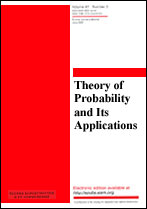|
|
Teoriya Veroyatnostei i ee Primeneniya, 1970, Volume 15, Issue 3, Pages 498–509
(Mi tvp1857)
|
 |
|
 |
This article is cited in 271 scientific papers (total in 271 papers)
The invariance principle for stationary processes
Yu. A. Davydov
Leningrad
Abstract:
Let $X_t$ be a stationary process, $\mathbf EX_t=0$, $\mathbf DX_t=\sigma^2<\infty$, $S_T=\sum_1^TX_t$ (discrete time), or $S_t=\int_0^TX_t\,dt$ (continuous time). Define $X_T(t)$ as in (1) or (2). Let $B_T(s,t)$ be the covariance function of $X_t(t)$. Let distribution $P_T$ correspond to the process $X_T(t)$ and distribution $W_\gamma$ correspond to a Gaussian process with the covariance function
$$
B_\gamma(s,t)=\frac12(s+t+|s^{1/\gamma}-t^{1/\gamma}|^\gamma).
$$
Theorem 1. If $\psi(T)=\mathbf DS_T\uparrow\infty$, $P_T\Rightarrow W_\gamma$, then $B_T(s,t)\to B_\gamma(s,t)$ and $\psi(T)=T^\gamma h(T)$, where $h(T)$ is a slowly changing function.
Theorem 2. {\em Let $X_j=\sum_{i=-\infty}^\infty c_{i-j}\xi_i$ where $\xi_i$ are independent identically distributed random variables, $\mathbf E\xi_i=0$, $\mathbf E\xi_i^{2k}<\infty$ and $\sum c_j^2<\infty$. If $\mathbf DS_n=n^\gamma h(n)$, $2/(k+2)<\gamma\le2$, where $h(n)$ is a slowly changing function, then $P_n\Rightarrow W_\gamma$.}
In the next two theorems the invariance principle is proved for processes generated by mixing processes.
Received: 22.02.1968
Citation:
Yu. A. Davydov, “The invariance principle for stationary processes”, Teor. Veroyatnost. i Primenen., 15:3 (1970), 498–509; Theory Probab. Appl., 15:3 (1970), 487–498
Linking options:
https://www.mathnet.ru/eng/tvp1857 https://www.mathnet.ru/eng/tvp/v15/i3/p498
|


| Statistics & downloads: |
| Abstract page: | 746 | | Full-text PDF : | 341 | | First page: | 3 |
|




 Contact us:
Contact us: Terms of Use
Terms of Use
 Registration to the website
Registration to the website Logotypes
Logotypes








 Citation in format
Citation in format 
